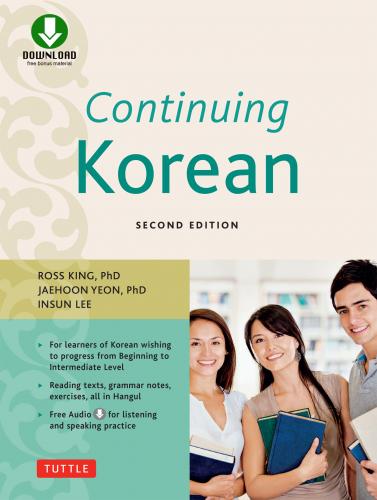16.4. Descriptive Verb + -어서 죽겠어요 : so . . . I could die
You can use the infinitive plus 서 pattern in combination with a descriptive verb (usually one describing a mental state or physical sensation) and 죽겠어요 I think I’m going to die to create a lively, colloquial pattern meaning: I feel so . . . I could die or I’m incredibly . . . , and so on. Here are some examples.
| 52. | 배가 고파서 죽겠어요. I’m starving [“so hungry I could die”]. |
| 53. | 머리가 아파서 죽겠어요. I have an incredible headache. |
| 54. | 어머니가 보고 싶어서 죽겠어요. I miss my mother terribly. |
| 55. | 기분이 나빠서 죽겠어요. I’m in a foul mood. |
16.5. NOUN-에 대해서, NOUN-에 관해서: about, concerning
The postpositional phrase -에 대해서 means about, with respect to, concerning, etc. The postpositional phrase -에 관해서 means the same thing, but is somewhat more formal and bookish. Here are some examples.
| 56. | 만호 씨는 컴퓨터에 대해서 많이 알고 있어요. Manho knows a lot about computers. |
| 57. | 영국 사람들은 언제나 날씨에 대해서 이야기를 합니다. English people always talk about the weather. |
| 58. | 어제 문 박사님은 한국 경제에 관해서 강연을 하셨습니다. Yesterday Dr. Moon gave a lecture about the Korean economy. |
16.6. -거든요: . . . , you see?
The verb ending in -거든요 is a one-shape ending and can occur with any base, though usually you will encounter it on Plain and Past bases more than on Future bases. L-extending bases appear in their extended form before this ending: 사-ᄅ- → 살거든요.
The ending in - 거든요 is used to offer a kind of follow-up explanation to what has just been said (or implied). A literal translation of its effect might be: I hasten to give you an explanation or rationale for what I just said (or implied) in perhaps too crude, obscure or blunt a fashion. In other words, the ending in - 거든요 also functions as a sort of politeness strategy or “grease on the skids” to keep conversational exchanges moving. It performs the latter function by inviting a response (notice that is usually has a rising, question-like intonation)—usually just an understanding 네 or a nod—from the person you are talking to. Often the only crude way to approximate the flavor of this ending in English is with the tag . . . you see? Here are some examples:
| 59. | 나는 김치를 못 먹어요. 너무 맵거든요. I can’t eat kimchee. It’s too hot. |
| 60. | 머리가 아파서 죽겠어요. 어젯밤 술을 너무 많이 마셨거든요. I have an incredible headache. Last night I drank too much. |
| 61. | 요즘 연 선생님은 아주 기분이 좋으세요. 지난달에 아들을 낳았거든요. Mr. Yŏn is in a really good mood lately. Last month they gave birth to a son. |
| 62. | 내일 다시 오세요. 준비가 아직 안 됐거든요. Please come again tomorrow. It’s not ready yet. |
Exercises
Exercise 1: Using -고
Each of the following items contains two sentences connected with 그리고 and. Combine these into a single sentence by using -고, and then translate. For example, the first will be: 진섭 씨는 한국 사람이고 에릭 씨는 영국사람이에요. Chinsǒp is Korean, and Eric is English.
| 1. | 진섭 씨는 한국 사람이에요. 그리고 에릭 씨는 영국 사람이에요. |
| 2. | 1사람은 도서관에 갔어요. 그리고 또 1사람은 기숙사에 돌아갔어요. |
| 3. | 아침에 일어나서 먼저 세수를 해요. 그리고 머리를 감아요. |
| 4. | 옷을 입어요. 그리고 아침을 먹지요. |
| 5. | 식사 후 이를 닦아요. 그리고 버스 정류장으로 나가요. |
| 6. | 학교에 와서 도서관에서 숙제를 마쳐요. 그리고 수업에 들어가요. |
| 7. | 오후에는 피아노를 연습해요. 그리고 운동장에 나가요. |
| 8. | 옷을 갈아입어요. 그리고 운동을 좀 하지요. |
| 9. | 저녁에는 집에 와서 쉬어요. 그리고 부엌에서저녁 식사를 준비해요. |
| 10. | 공부를 조금 더 해요. 그리고 자요. |
| 11. | 나는 이발소에 가요. 그리고 그분은 목욕탕에 가요. |
| 12. | 나는 면도를 했어요. 그리고 우리 집사람은 화장을 했어요. |
| 13. | 이것은 싸요. 그리고 저것은 비싸요. |
| 14. | 비행기는 빨라요. 그리고 자전거는
|
